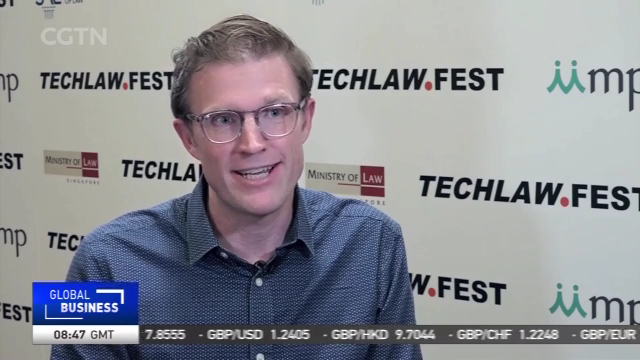
17:16, 13-Sep-2019
Data Age Privacy: Regulating AI-based apps, data misuse the need of the hour?
Updated
17:26, 13-Sep-2019

Artificial intelligence and facial recognition have been seen as the new frontier technology. But the potential for their misuse and the absence of strong legislation has also worried many. To tackle this issue, 1500 delegates from 18 countries attended the second edition of the TechLaw Fest in Singapore. CGTN's Miro Lu has more.
Fake News, Data Security and Artificial Intelligence, these keywords were in focus at TechLaw 2019 in Singapore.
The conference saw the legal and tech communities come together to discuss the need for stronger regulations in this data-driven age.
And who better to talk about tech and data than the creator of the World Wide Web. Sir Tim Berners-Lee called for increased efforts to reduce fake news and data misuse.
SIR TIM BERNERS-LEE INVENTOR OF WORLD WIDE WEB "When you have technology, you also have to have policy. So we will need, and that becomes more important, when I trust you that I have the ability to give you access to huge amounts of data about myself, also we really need good laws."
Concerns raised by Sir Tim seem pertinent, in light of the recent global debate over the use of AI-driven facial recognition technology.
The latest app sparks security concerns is Zao, a face-swap app created by Chinese online dating platform, Momo. Zao enables users to upload images and then its AI engine swaps their faces with those of celebrities in a wide range of films. After topping Chinese App Store immediately after its launch, the app quickly received a massive backlash as privacy implications began to sink in. This prompted Zao to update its "Terms and Conditions" and issue an apology.
Zao is just the tip of the iceberg. Social Media giant Facebook recently turned off its auto-tag suggestion feature. Users who want to use the feature will now have to specifically choose to opt in.
Abuse of data especially in the area of facial recognition continues to occupy centre stage in the minds of governments and legal experts alike.
BEN ALLGROVE, PARTNER BAKER McKENZIE "We need to bring regulators, lawyers, policymakers, and technologists together because no single one of those can solve the issues that come from face recognition. It depends on the use that you are going to make of that data."
Experts believe that key challenges remain before concrete legal remedies can be finalised to prevent misusage of AI-backed applications.
STANLEY LAI, PARTNER ALLEN & GLEDHILL "The biggest challenge with the governance of AI and AI-driven technologies is the fact that you are dealing with the absence of a human actor. So it is about reining in and controlling at one level, the people that make this technology possible and making sure that they held to account."
MIRO LU "Surely, a lot needs to be done to regulate facial recognition and face-swapping technology to limit its misuse - by both the authorities as well as the public. But the recent debate over Zao and other facial recognition apps goes to show that people are increasingly becoming more aware and are less willing to trade privacy for entertainment or convenience. Miro Lu, CGTN, Singapore.
SITEMAP
Copyright © 2018 CGTN. Beijing ICP prepared NO.16065310-3
Copyright © 2018 CGTN. Beijing ICP prepared NO.16065310-3